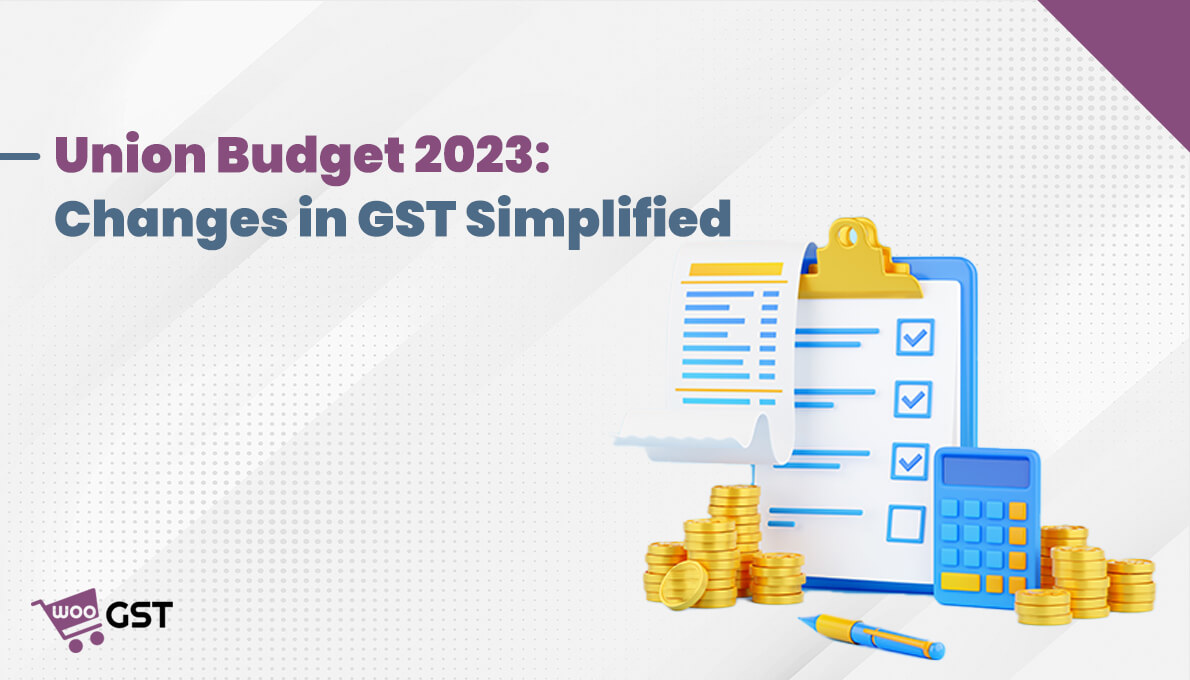
According to article 112 of the Indian constitution, the union budget for the year is a statement of the government’s anticipated receipts and outlays for that specific year.
It keeps the account of the government finance for the financial year and runs from 1st April to 31st March.
The Finance Minister’s Union Budget 2023, which focuses on streamlining the process for businesses and enhancing compliance, makes several adjustments to the Goods and Services Tax structure.
The significant adjustments made in the Union Budget tax 2023 and their effects on businesses will be covered in this blog.
Let’s have a look at the amendments suggested in the Budget-2023 with respect to GST or the latest GST notifications for the 2023 budget.
1. DEALER WHO SUPPLIES PRODUCTS VIA ELECTRONIC COMMERCE PLATFORM HAS THE OPTION OF USING A COMPOSITION SCHEME
According to the existing law, a dealer who is supplying goods through an electronic commerce platform can’t go for the composition scheme. Currently, it is suggested to eliminate this restriction with change.
Since this legislation was passed, composition dealers are now able to sell goods within a State using an E-Commerce operator.
One thing to keep in mind is that the GST Composition Basic Scheme does not permit composition dealers to make interstate deliveries, so this scheme is solely intended for intrastate sales. Among the most important budget tax changes for GST 2023 is this one.
2. PURCHASER’S LATE PAYMENT – 180 DAYS
If the dealer hasn’t paid his vendor within 180 days, he will need to reverse the proportionate ITC with the output tax liability rather than adding it together with it.
If the customer hasn’t paid the vendor within 180 days of the invoice date, in accordance with proviso 2 of section 16, The recipient’s output tax liability will be increased by the amount equivalent to the input credit he or she claimed, plus interest.
3. NO REGISTRATION FOR EXEMPT DEALER
According to section 23 of CGST Act 2017, a dealer who is dealing in exempt or non-taxable goods is free from GST registration. Along with section 23, there were another two sections section 22 (Person liable for registration) and section 24 (compulsory registration).
Currently, it is intended to replace Section 23 with a new Section 23. And it is clearly stated that section 23 is applicable “Regardless of anything to the contrary provided in Section 24 or Subsection (1) of Section 22.
According to section 23 dealers coming under this section are exempt from registration.
Even if a person is covered by sections 22(1) and 24, they are not needed to register if they are exempt from receiving the registration under section 23, which includes those who deal in exempt or non-taxable items.
4. TIME LIMIT FOR SUBMITTAL OF SOME RETURNS
Through this change, the deadline after which some returns cannot be filed is introduced for the first time.
If a dealer has not filed some returns, he may do so by paying late fees; nevertheless, these returns may be filed whenever after the due dates, and there is no time limit after which the dealer may not file the returns even after paying the late fees.
Now, several changes are being considered to shorten the time after which these returns cannot be filed.
Few returns such as GSTR-3B, GSTR-1, and GSTR-8 are not filed after 3 years.
5. PENAL PROVISION FOR OPERATORS OF ELECTRIC COMMERCE
Penal measures are being brought if an e-commerce operator lets an unregistered dealer conduct business using its platform and further permits a such dealer to conduct business internationally.
For the following infractions, new punitive provisions on ECO are being proposed:
- The statement required by the subsection needs to be filled out correctly with the necessary information.
- Any supply made by an unregistered dealer that is not specifically exempted from registration by a notification.
- Composite dealers make any interstate supplies.
The penalty is Rs. 10,000, and For the registered dealer it must be tax amount or penalty amount, whichever is high.
6. PROSECUTION AND ITS MONETROY LIMITS
The overall limit for all offenses has been raised from 1 crore to 2 crores, with the exception of fake invoices, and some of the offenses have been taken off the prosecution list.
This budget gives relief against the harassment of dealers by removing some of the offenses from the list.
3 offenses mentioned in section 132 (1) have been decriminalized under this amendment. Since the 3 infractions are no longer punished under section 132(1) of the CGST Act, 2017, no legal action may be taken against anyone for them.
The Budget 2023 has also proposed several other changes to the GST 2023 structure such as compounding offenses, sharing information, integrated goods and supply tax amendment, etc.
The simplification of the return filing process, the introduction of a fully automated refund process, and the reduction in GST rates for certain items are expected to benefit businesses and consumers. The introduction of a new scheme for small taxpayers and a new system for e-invoicing is also expected to improve compliance and reduce the possibility of tax evasion. Overall, the Union Budget tax changes in 2023 are expected to create a more streamlined and efficient GST system, which will benefit businesses and the economy as a whole.
If you want to run a business online we offer a GST Plugin for WooCommerce that manages GST setting for the woo-commerce online store.
All Rights Reserved. © 2023